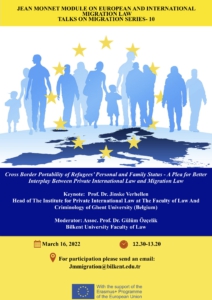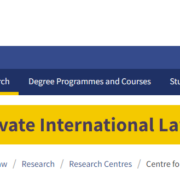Meeting of the Council on General Affairs and Policy
The Council on General Affairs and Policy of the HCCH met online from 28 February to 4 March 2022, with over 450 participants. Over the course of five days, HCCH Members reviewed progress made to date and agreed on the work programme for the year ahead in terms of normative, non-normative and governance work. More information is available here.
Several important developments relating to Membership and HCCH Conventions occurred during the meeting:
- El Salvador deposited its instrument of acceptance of the Statute, becoming the 91stMember of the HCCH.
- Ecuador signed the 2007 Child Support Convention and 2007 Maintenance Obligations Protocol and deposited its instrument of ratification of both instruments, which will enter into force on 1 July 2022.
- The United States of America signed the 2019 Judgments Convention, becoming its sixth signatory.
More information on these developments is available here.
Other developments
Conventions & Instruments
On 1 January 2022, the HCCH 1965 Service Convention entered into force for Georgia. It currently has 79 Contracting Parties. More information is available here.
On 18 February 2022, the Philippines signed the 2007 Child Support Convention. The Convention will enter into force for the Philippines further to the deposit of its instrument of ratification. More information is available here.
Meetings & Events
From 11 to 20 January 2022, the International Hague Network of Judges (IHNJ) met via videoconference, with the participation of judges from 35 States. Established in 1998, the IHNJ facilitates international cooperation and communication between judges on the cross-border protection of children. More information is available here.
On 28 January 2022, the HCCH participated in the panel discussion “Thailand and the HCCH Core Conventions: Connecting Possibility and Approach”, organised by the Ministry of Justice of Thailand.
From 7 to 9 February 2022, the International Transfer of Maintenance Funds Experts’ Group met via videoconference. The Group continued its work discussing good practices and identifying possible future improvements in relation to the cross-border transfer of child support payments, with a view to facilitating the most cost-effective, transparent, prompt, efficient and accessible cross-border transfer of funds. More information is available here.
From 14 to 18 February 2022, the second meeting of the Working Group on Matters Related to Jurisdiction in Transnational Civil or Commercial Litigation was held via videoconference. The Group made further progress on the development of draft provisions on parallel litigation in civil or commercial matters, which may occur when separate proceedings are instituted before the courts of different States. More information is available here.
Publications and Documentation
On 22 February 2022, the Permanent Bureau launched consultations on the draft Practical Handbook on the Operation of the 2000 Protection of Adults Convention. More information is available here.
On 28 February 2022, the Permanent Bureau announced the publication of the HCCH 2021 Annual Report. More information is available here.
Vacancies
Applications are now open for three- to six-month legal internships from July to December 2022. The deadline for the submission of applications is 17 March 2022 (18:00 CET). More information is available here.
These monthly updates are published by the Permanent Bureau of the Hague Conference on Private International Law (HCCH), providing an overview of the latest developments. More information and materials are available on the HCCH website.





